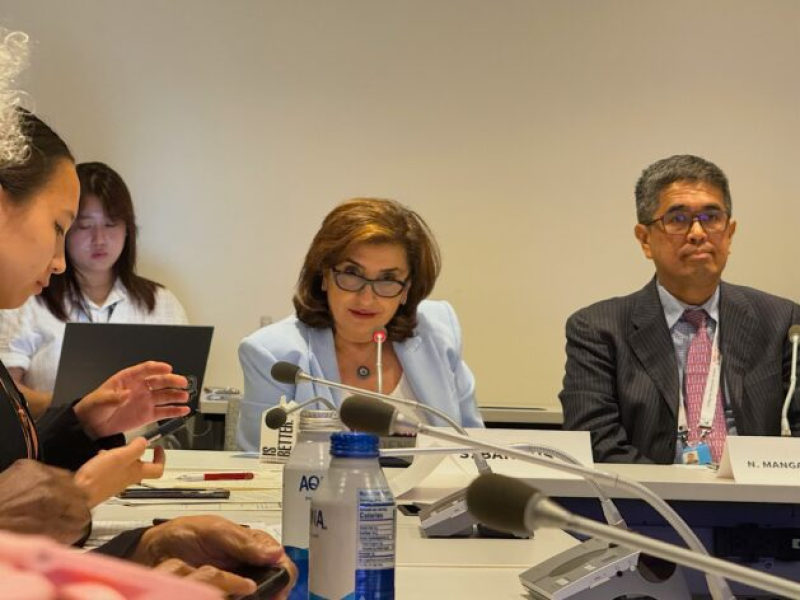- India Sees 9% Drop in Foreign Tourists as Bangladesh Visits Plunge |
- Dhaka Urges Restraint in Pakistan-Afghan War |
- Guterres Urges Action on Safe Migration Pact |
- OpenAI Raises $110B in Amazon-Led Funding |
- Puppet show enchants Children as Boi Mela comes alive on day 2 |
Protect Women’s Rights amid Backlash, Say Global Activists

Discriminatory laws and the absence of legal protections impact more than 2.5 billion women and girls worldwide in various ways. Legal reform is paramount to securing gender equality, and the world cannot afford to roll back decades of progress in women’s rights.
On the sidelines of the 2025 High-Level Political Forum on Sustainable Development on July 17, Equality Now and UN Women, together with partners including the International Development Law Organization (IDLO), the Global Campaign for Equality in Family Law, the Global Campaign for Equal Nationality Rights (GCENR), and the Inter-Parliamentary Union (IPU), hosted an official side event titled, “Accelerating Law Reform to Keep the Promise of Beijing, the SDGs, and the Pact for the Future.”
The event spotlighted successes in ending discrimination through the passing of robust, inclusive legislation, while acknowledging the ongoing fight against legal discrimination targeting women and girls. Equality Now Executive Director Mona Sinha emphasized the urgency of protecting the right to equality on the basis of sex as a fundamental human right, especially amid the current backlash against gender equality.
“At UN Women, we are proud to lead a global strategy to achieve equality in law for women and girls by 2030 with our partners… We are racing against time to repeal discriminatory laws and replace them with protections rooted in dignity and equality,” said UN Women Executive Director Sima Bahous.
The event coincided with the launch of a joint publication from Equality Now and GCENR titled ‘Select Draft Articles on Nationality Rights to Ensure Gender Equality,’ aimed at guiding policymakers in drafting inclusive nationality rights laws that protect women and their families.
Catherine Harrington, Campaign Manager of GCENR, described the “utter injustice” of laws in 24 countries where women cannot pass citizenship to their children, and in at least 40 countries where women cannot confer citizenship rights to a non-citizen spouse. Such restrictions block access to other fundamental rights, including education, healthcare, and the right to return home.
The fight for equal nationality rights exemplifies broader gender equality challenges, showing how legal discrimination leaves women vulnerable to rights denial and exploitation.
“What does it say about women’s status as citizens and their equality in the family when the law allows men to pass citizenship but denies the same to women?” Harrington asked. She further linked discriminatory laws to the root causes of gender-based violence.
Women’s participation in politics is a vital measure of gender equality. While some countries have increased women’s representation through quotas, men still hold three out of four parliamentary seats globally. Creating gender-inclusive and safe political environments is essential.
“Democracy cannot be credible or effective if it does not reflect the diversity of people,” said Paddy Torsney, IPU Permanent Observer to the UN. He emphasized that inclusive policies and zero tolerance for gender-based violence are key to empowering women’s leadership.
Hikaru Yamagishi from the World Bank highlighted the “implementation gap” between legal rights and lived realities, noting that while women have 64% of men’s legal rights, less than 40% of the systems exist to enforce those rights.
Several countries shared their experiences in legal reform. Kyrgyzstan reformed labor laws to open previously restricted professions to women and increased employment opportunities in rural areas. The Philippines cited its Magna Carta of Women (2009) as a milestone in advancing gender equality.
Despite progress, true gender parity remains a work in progress, requiring partnerships across governments, civil society, private sectors, and international bodies like the UN and World Bank.
Antonia Kirkland, Equality Now’s Global Lead on Legal Equality and Justice, praised the UN’s role in pushing transformative legal reforms and providing a platform for women’s voices, especially from the Global South.
However, she warned against anti-rights movements that seek to erase gender concepts from UN frameworks, which risks undermining human rights standards and accountability for gender-based violence.
The UN must strengthen monitoring and enforcement of international commitments like CEDAW and the SDGs and maintain strong, well-funded leadership amid rising authoritarianism and backlash.
“Let us invest in feminist leadership and enshrine equality not only in speeches but in statutes and actions,” Bahous concluded. “The law must be a guarantee of justice, not oppression. Only then can we achieve equality for all women and girls and get back on track to the SDGs.”

